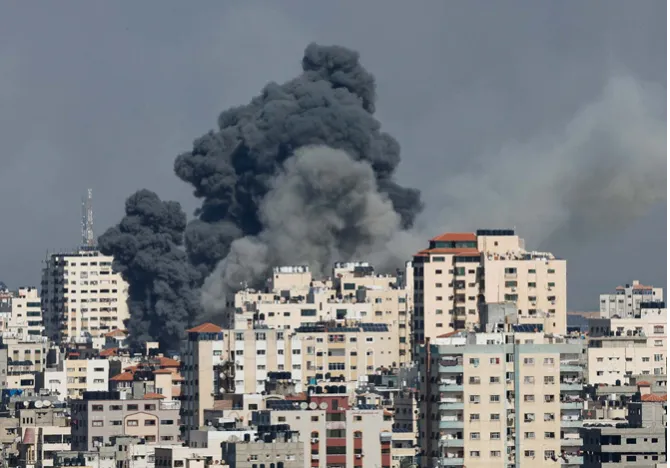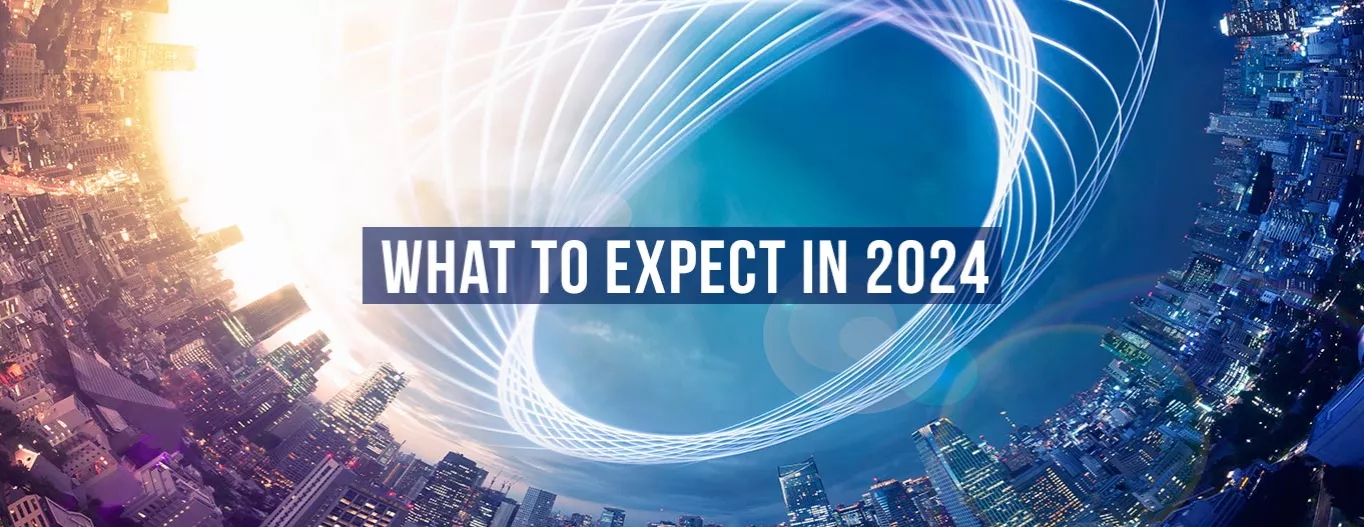
This essay is part of the "What to expect in 2024"
The terror attack by Hamas against Israel on 7 October arguably ended a rose-tinted overview of undercurrents of security in West Asia (Middle East) amidst the euphoria of normalisation processes being undertaken in the region. Although not exclusively by design, the attacks and the ensuing hostage crisis did work well in casting a shadow over what a “new” Middle East would and should look like. In short, two messages were delivered in the most gruesome manner. First, tall, gleaming glass buildings and large infrastructure projects cannot substitute for long-term and sustainable processes for building peace. And second, intra-regional normalisation processes now cannot brush the Palestine issue under the rug.
The Israeli state and its people will prioritise the conflict over any other regional diplomatic architecture.
With Israel’s intended strategy in the fallout of 7 October—that of annihilation of Hamas in Gaza—the conflict is all set to go well into 2024. The Israeli state and its people will prioritise the conflict over any other regional diplomatic architecture. For this, Israel’s Prime Minister, Benjamin Netanyahu, despite his lack of popularity and calls for his removal, will see the country’s actions through the coming months. And these few months will also determine how the Arab states will manoeuvre their relationship with Israel, the United States (US), and by association, other partner states both in the West and East alike.
The Israel-Palestine trajector
7/10 attacks changed multiple things for both Israeli geopolitics and domestic politics. To begin with, Israel is tasked to rebuild a fundamental institution it had cultivated over decades, so much so its successes and invincibility were enshrined in facts, fables, and Hollywood storytelling. From the Israel Defence Force and famed technologies such as Iron Dome to its agencies from Mossad to Shin Bet, Israel’s perception of water-tight securitisation lies in tatters. Rebuilding this would be critical for the state to reinstall a sense of security within its population.
Simultaneously, regional Islamic powers would also need to review how they hope to move forward on the Palestine issue. The fact that states such as Egypt and Jordan have refused to host Palestinian refugees attempting to flee Gaza highlights the complexities that go beyond just the Arab–Jews narrative. Along with the population, the Palestinian geography holds equal equity. Any displacement means that soon, Palestinians will have less of a say on the future of both Gaza and the West Bank. What Israel plans to do regarding a political track along with its current military operations will be a critical aspect of how this conflict evolves in 2024.
With Israel’s publicly stated aim of ‘destroying’ Hamas as the primary policy, the war may continue well into the coming year even if Hamas hierarchy, such as the organisation’s Gaza military (Qassam Brigades) chief Yahya Sinwar, are eliminated.
Finally, regionally, there is no monolithic ‘Arab’ view on the Palestine issue. While many regional states agree that the crisis needs a long-term, viable, and acceptable resolution, most within this block first look at the issue from the lens of their individual strategic interests. With Israel’s publicly stated aim of ‘destroying’ Hamas as the primary policy, the war may continue well into the coming year even if Hamas hierarchy, such as the organisation’s Gaza military (Qassam Brigades) chief Yahya Sinwar, are eliminated. Beyond Gaza, Hezbollah’s presence in Lebanon and Syria also risks an extension of the conflict into other territories.
Regional and international concerns
While the process of diplomatic normalisation in the Middle East has been celebrated over the past years, from the Abraham Accords signed in 2021 to the more recent Saudi–Iran détente brokered by China, it is the Israel–Iran conflagration which has no resolution in sight. Tehran looks upon Israel from a ‘Huntingtonian’ view[1], that is, as a clash of civilisations, and not merely about geography, borders, or strategic one-upmanship. This is further exacerbated by the fact that both Israel and Iran as of today stand against a two-state solution.
From a regional and international level, there are multiple areas where concerns spill well beyond the Middle East’s geographic interests. Recent attacks against commercial vessels in the Red Sea, including those sailing to and from India, by Houthi militants in Yemen who have vowed to act in favour of Hamas, bring in an international dimension of protecting these vital waterways. While the Strait of Hormuz has always been a flashpoint, the Bab al-Mandeb Strait leading into the Red Sea and the Suez Canal which carries around 12 percent of all global trade raises the stakes for regional and international actors to protect and maintain the sanctity of these waterways. As India’s economic stakes also grow, the share of Indian seafarers is also expected to rise drastically over the coming decade, from the current 8 percent to 20 percent of the total global strength.
Recent attacks against commercial vessels in the Red Sea, including those sailing to and from India, by Houthi militants in Yemen who have vowed to act in favour of Hamas, bring in an international dimension of protecting these vital waterways.
The above scenario is particularly critical for large Asian economies such as India, Japan, South Korea, and China, all being net importers of oil and gas and relying heavily on supplies from the Middle East for their energy security. The US has also now called upon partners to build a multinational task force to protect these shipping lanes from sophisticated attacks being conducted by militias such as the Houthis.
Multilateralism and Global South
The US veto for a ceasefire in Gaza at the United Nations Security Council laid further ground for debate on the future of post-World War II multilateralism, its veracity in the current climate, and how a rising Global South views these West-centric institutions. It also feeds into a larger US–China competition currently fermenting globally.
The Palestinian cause does raise significant support in the Global South, specifically when seen from a ‘de-colonisation’ perspective. However, again, like the Arab world, the ‘Global South’ is not a monolith. Countries like India (amongst others) that seek reforms of the UNSC and place themselves in leadership roles to represent the Global South will have to balance between prevailing realities and their own realpolitik. These challenges will see an increase in 2024, with 2023 witnessing a total of 183 regional and local conflicts underway, the highest number in the last three decades.
The Palestinian cause does raise significant support in the Global South, specifically when seen from a ‘de-colonisation’ perspective.
Beyond bilateral and regional diplomacy, the war in Gaza also spills over into a challenging global order where states like India and China are looking to carve out more space for themselves and their individual interests as traditional multilateral mechanisms to address the Middle East’s conflicts appear in a derelict state.
Between regional and international intricacies, the impact of the war in Gaza may dilute as Israel continues a long-term military campaign, but fundamentally it will continue to challenge global security as a long-standing flashpoint. It may also force a level of recalculation of how the economic evolution of the region is tied to addressing the region’s poor track record of addressing conflict and maintaining long-term stability by delivering sustainable security.
Kabir Taneja is a Fellow with Strategic Studies Programme at the Observer Research Foundation
[1] The ‘Huntingtonian’ view refers to American political scientist Samuel P Huntington’s noted 1996 text titled ‘The Clash of Civilizations’, arguing that people’s cultural and religious identities will be the primary source of conflict in the post-Cold War era.
The views expressed above belong to the author(s). ORF research and analyses now available on Telegram! Click here to access our curated content — blogs, longforms and interviews.




 PREV
PREV



